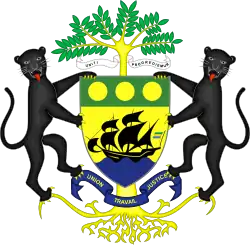Energy in Gabon
Energy in Gabon comes from two main sources, fossil-fuels and hydroelectricity. Gabon also relies heavily on oil for its export revenues, exporting both crude oil and petroleum. In terms its oil reserves, the country is one of the richest in sub-Sharan Africa, ranking 5th after Nigeria, Angola, Sudan, South Sudan, and Uganda.[1] Renewable energy in the form of solar power is virtually nonexistent.
Gabon is among Africa’s biggest crude oil producers. However, the country aims to diversify its economy by further developing its agriculture, fisheries, technology, and ecotourism sectors.[2]
Gabon’s total electricity production in 2015 was 199 kilotonne of oil equivalent (ktoe), with 51.7% produced from hydropower sources and 48.2% from fossil fuels. The country’s final consumption of electricity was 169 ktoe.[3]
As of 2014, 15% of rural areas had electricity.[4] The country aims to provide electricity to 85% of rural areas by 2025 and universal access to electricity by 2035.[4]
Oil
Gabon, a former OPEC member (1975–1994) that rejoined in 2016, is the sixth-largest[5] oil producer in sub-Saharan Africa, and has the region's fifth-largest oil reserves.[6] Oil prospecting began in 1931. Deposits were found on the coast or off shore in the vicinity of Libreville, northwestern Gabon and Port-Gentil, along the coast and in the southwestern part of the country. Larger deposits were found in the south. Oil from the northwest is channeled by pipeline to Cape Lopez, where there are loading facilities for export. Additional deposits were found on Mandji Island in 1962. The Rabi Kounga oil field, operated by Shell Gabon, is Gabon's largest oil field. In 1997, it produced a peak of 217,000 barrels per day (34,500 m3/d). As of November 2004, it was producing 55,000 barrels per day (8,700 m3/d).
The first national oil company was the Société Nationale Petrolière Gabonaise but it was disbanded in 1987. The government of Gabon controls all petroleum and mineral rights within the state. In 2011 a presidential decree created the Gabon Oil Company (GOC).[7] This new entity works in partnership with international companies operating in Gabon and operates two fields: Obangue and Remboue.[7]
Petroleum
Although Gabon's proven petroleum reserves rose from 1,300 million barrels (210×106 m3) in 1996 to 2,500 million barrels (400×106 m3) in 2004, the government is concerned about long-term depletion of resources. Total production of crude oil fell from a peak of 371,000 barrels per day (59,000 m3/d) day to an estimated 289,700 barrels per day (46,060 m3/d) in 2003. Gabon's production goes primarily to Argentina, Brazil, France, the United States, and, more recently, Taiwan. Net oil exports in 2003 are estimated at 289,680 barrels per day.
As of January 2004, reserves of natural gas reserves estimated at 1.2 trillion cubic feet (34×109 m3), by the Oil & Gas Journal. Production and consumption of natural gas in 2002 were estimated at 3 billion cubic feet (85×106 m3), each. Gross output stood at 81.22 billion cubic feet (2.300×109 m3) in 2002, of which 55.09 billion cubic feet (1.560×109 m3) was flared or vented off, and 19.42 billion cubic feet (550×106 m3) was reinjected.
Hydropower
In 2002 there were hydroelectric stations at the Kinguélé and Tchimbélé dams on the Mbei River and at the Petite Poubara Dam, near Makokou on the Ogooué. Production and distribution of electricity are maintained by the Energy and Water Company of Gabon (SEEG), which was formed in 1963 and incorporates a number of smaller private and quasi-public entities. In 2002, electric power output totalled an estimated 1.16 TWh, with capacity estimated as of January 2002 at 406 MW. Consumption of electricity was 1.275 TWh in 2002. Natural gas is the principal fuel for the thermal plants. Hydropower accounts for 11% of Gabon's electric power consumption in 2013.
References
- "Gabon Energy Situation - energypedia.info". energypedia.info. Retrieved 2019-12-05.
- Megayo, Jeff (May 2020). "Post COVID-19: Positioning Africa- Ecotourism for Gabon's diversification strategy". Ecofin Agency. Retrieved 2020-05-23.
- "Energy Profile: Gabon" (PDF). United Nations Environment Programme.
- "Gabon seeks universal power access by 2035". Oxford Business Group. 2015-08-20. Retrieved 2020-05-23.
- Gabon Country field, accessed online on 20/05/2014 on http://www.eia.gov/countries/cab.cfm?fips=GB
- Gabon Country File, accessed online on 30/05/2014 on http://www.eia.gov/countries/cab.cfm?fips=GB
- "Web Page Under Construction". www.gabonoil.com.
![]() This article incorporates public domain material from the Library of Congress Country Studies website http://lcweb2.loc.gov/frd/cs/.
This article incorporates public domain material from the Library of Congress Country Studies website http://lcweb2.loc.gov/frd/cs/.
